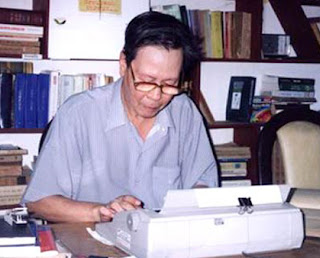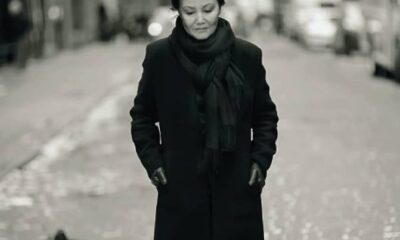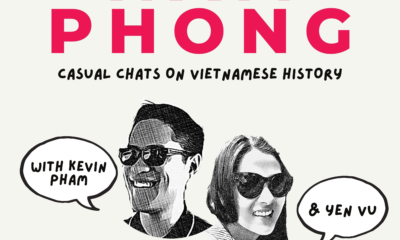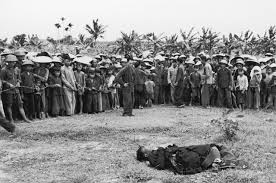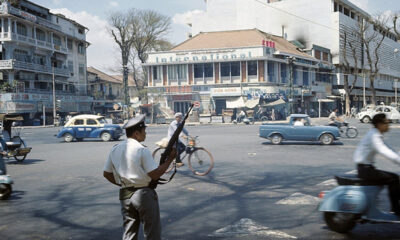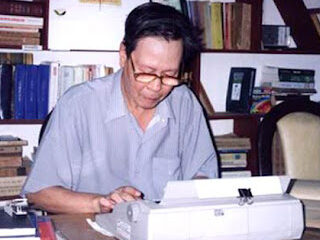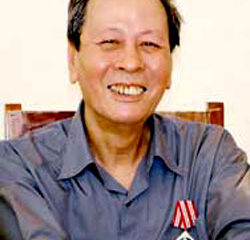Editor’s Note: The following excerpt is from a memoir by the esteemed writer Nguyễn Mạnh Khải (1930-2008), celebrated as one of the foremost literary figures in communist Vietnam. His lifetime was marked by numerous accolades, including the Le Thanh Nghị Literature Prize (Regional Level III, 1951), the Vietnamese Arts and Literature Prize (1951-1952), the Vietnamese Writers’ Association Prize (1982), the Southeast Asian Literature Award (2000), and the prestigious Ho Chi Minh Prize for Literature and Art (2000). Originally penned in Vietnamese and published posthumously in 2006, this collection has been translated by our editor Vinh Pham. The memoir will be presented in six installments.
Political Essays – 2006
Nguyễn Khải
1.
At 70 years old, I began to tire of writing. Eyes grew weary, reading even from a reclined position, and after fifteen minutes, the words would blur, and I lost track of what I was reading. Then I’d fall asleep. Sleeping like a bird, I’d wake in an instant, continuing to read the unfinished half-page, only to find the words hazy because I couldn’t recall what they had written in the previous half-page I read.
In that year, I received the Ho Chi Minh Prize for Literature and Art, 2nd cycle. I was pleased, but I realized it was a sophisticated tombstone placed upon a lifetime of writing that had come to its end. And so, I felt melancholic, drifting in and out of thoughts for a whole month.
I decided to venture North, returning to my birthplace where I registered for military service in 1946. It was also the place where I began writing articles for the resistance, printed in litho in 1949, setting the stage for decades to come, as both a soldier and a writer. The once quiet and modest provincial town, dimly lit, shrouded in the same green and black hues of the years past, had transformed into a district of Hanoi or Saigon of today.
Memories flooded back to the short streets, low houses, narrow alleys, shaded by longan trees, the faces of gentle people, walking leisurely. The town resembled a large village; you had to exchange greetings every stretch of road, as countless familiar faces passed by. Several decades later, returning to the town of my young adulthood, but this being the third time (the two prior times being over twenty years ago), the familiar land seemed distant.
I biked all day without meeting anyone familiar, or if I did, they were two old men in their seventies, how could they recognize each other from when they were eighteen or twenty? The second time I returned, there were still three familiar faces: one was Thuận, a retired colonel, another was Tùng, a platoon leader, and the third was Mễ, a squad leader—my first command roles in the military.
This time, I met with Thuận, who was also my first newspaper editor; he was a few years older than me. The other two had passed away, both beyond seventy. Unfamiliar streets, unfamiliar faces, and only one close friend who attended meetings day and night, all sorts of gatherings just to see old friends, to chat and reminisce about the past, to complain, to complain about everything—family matters, national matters. It’s also sad, isn’t it? Can the affairs of old folks ever be joyful? Once one has completed a task, what else can bring joy?
Because I’m a local, the provincial party committee met and invited me for a meal to show respect. But looking at the faces of the current officials, I was astonished. Every face was full of wrinkles, rough, talking a lot, laughing loudly, using vulgar language, never looking directly at you when speaking, as though they were talking to someone else sitting next to or behind you.
I was about to return to Hanoi when the provincial party secretary invited me to meet again, not an official meeting, just to have breakfast together because he was busy too. The meeting was both formal and uncomfortable; only the provincial leadership spoke, sounding like a vendor, eyes wandering, thoughts drifting. I only remember one thing: there was a general, a famous one, a local, who brought a rare type of flower from Hanoi, and he personally planted it in the provincial party committee’s flower garden. He did it himself, because he had to choose the right day, the right time, even the right direction to bring prosperity and happiness to the people of the province. Is it true?
In the past few days visiting the village, there’s been a mixture of joy and sadness. Everyone seems wealthier than before, cooking with electric rice cookers, watching color TV at night, and now in their leisure time, engrossed in TV series. Every hamlet has a shop renting video tapes, there are brothels offering comfort until harvest season arrives, gambling parlors, and users of opium and heroin—everything the city has, the village has too, both the good and the bad, perhaps even more so.
I went to a village where a postal worker let me stay at his house. Whenever I asked about something, he always said he didn’t know. For three days in the village, no one from the party committee or the local authorities would meet with me. One evening, a stout young man came to visit with the family. Both the husband and wife of the house spoke respectfully, with humble manners. He sat slouched in a chair, legs spread wide, hands resting on his belly, making empty conversation and occasionally glancing at me, but not asking anything. He didn’t greet me, his eyes just wandered aimlessly, though he was barely as old as my children or grandchildren. I thought this guy must be a businessman from the province, somehow related to the homeowner. I stayed for a short while, then left. But the postal worker told me he was the village chairman. That surprised me again!
A few days later, I visited a village in the northern part of the province. About thirty years ago, I had gone there for a year to write about a village chairman who was not yet thirty during the peak of agricultural collective movement. While spending time in the district town adjacent to the village, I unexpectedly encountered an old acquaintance from decades ago. Now, he was over sixty years old, running a photo studio on the street, stout and well-groomed. He knew everything, and he could vividly recount all of his knowledge, presenting it in a lively, fresh way. Listening to his stories felt as though I was witnessing them firsthand. If a writer could meet someone like him, a whole book could be written quickly, as all the material was readily available.
All the troubles and sadness of the sudden journey were compensated beyond measure by meeting an old friend again. Just as I was joyously elated, a group of men barged in, and I was interrupted. The head of the village police followed their lead, acting as both a guide and a protector. I could only converse with those who were introduced by the village and stayed at the house of the village party secretary. But I wasn’t about to give in completely. In the cold village, I mingled with the locals, writing about a farmer facing hardships, which my friends praised as quite impressive. In the overly favored village, I wrote a satirical article titled “Lost Another Book.”
At the age of 70, all human activities slow down, falter, but my writing still retains its former elegance, remaining as fast as ever. However, my observation has intensified, more contemplative and reflective. It’s a fragrant flavor extracted from over seventy years of being human.
2.
I was a child when I entered life, facing many setbacks, yet I knew how to hold onto the era and climb gradually. I say this not out of opportunism; nowadays, who would like to attribute their success solely to revolution? Many have been embraced by the revolution, nurtured and protected, yet they still fall short. Why? Because they lack another element, that quality of innate humor. First and foremost, it’s about knowing how to mock oneself, observing each step, every word of mine, through the eyes of others, both sternly and playfully.
Later, it extends to others. I often see the ironic aspect in others, no matter how dignified their outward appearance may be. The comical aspect is the contradiction within the same person. The hypocrite speaks of ethics, the thief preaches about honesty, and the oppressor portrays himself as the ultimate sycophant. If we widen our perspective, there are countless instances of humor we encounter everywhere, at all times in life.
The ignorant often put on an air of wisdom, the timid strive to appear heroic, and vacuous politicians always maintain an air of sagacity through meaningless words. If these people had a touch of humor, the ability to observe themselves while performing, they would know how to exercise self-restraint within certain limits.
Desiring what one cannot have is not only laughable but also an incurable ailment of humanity. Philosophers and religious leaders are not exempt from this amusing game. They wish to offer mankind what they cannot possess, attempting to save humanity through numerous means, often leading to self-delusion or nothing more. Social theories and wise teachings must be open theories, capable of being this way or that, constantly evolving, using the ever-changing nature of the times and individuals as the ultimate target for self-adjustment.
Theories are crafted by humans, yet even the most brilliant minds are still bound by the conscious and subconscious loops of the era and life. They cannot be gods, knowing the countless causes of interactions, twists, and unexpected turns that lead all things through minute changes, unnoticed by most, culminating in significant transformations. No theory accurately predicts what will transpire in the future, nor can it foretell the ultimate outcome of many ongoing events in the present. Every prophecy bears an element of delusion and coincidence. Spending an entire youth believing in such prophecies, only to look back in old age and realize that the accumulated spiritual wealth of a lifetime is merely a storage of worthless clutter, devoid of any real value.
3.
A sense of humor is something that communists detest the most because it can turn all sacred matters into laughter. A theory that cannot prove its correctness in practice will eventually become a religion. Religion is faith, habit, tradition, obedience; it is the belief that in this world, there is only one truth. To question it, to doubt it, is to be a heretic, to be expelled from the community, to be isolated, imprisoned to prevent potential infection. Social theories have had to don the robes of religion in order to survive, making everything associated with them sacred. Leaders become holy deities, their words and writings turn into sacred scriptures, their personal and societal lives brim with extraordinary tales. Images of Lenin and Stalin, Mao Zedong and Kim Il-sung, and the words of these figures cast a shadow over the entire spiritual life of the nations they lead, dictating their actions, words, and thoughts.
Songs about these leaders are as solemn as hymns, sung with a reverent demeanor like devout followers. The personal worlds of citizens have been incinerated, reduced to ashes and dispersed in the smoky aroma of altars. In an atmosphere ablaze with fire and unending waves of cheers, there’s no respite. In this scenario, where can those who work with their intellect find a quiet and free space to contemplate their life’s work? Communists will never understand the process of personal work, solitary and removed from the masses, distant from the localized revolutionary movements that intellectuals are steeped in. They must be transformed through practical experiences, through short or long political education sessions, and through intimate encounters with leaders that instill additional trust in the need for self-denial, to assert the greatness of the masses’ cause.
They must abandon philosophical ideas and world views that align with their own way of thinking, their own perspective, their own evaluations, as proven through their own experiences, and instead assimilate into the mainstream ideological thought, the orthodox philosophy, the standard viewpoint, the proper assessment. Ultimately, none of these matters much when it comes to the inner contemplation, the things that need to be written, and above all, personal discoveries in history, culture, and human existence. Without these, continuing to live is meaningless, and continuing to write serves little purpose, causing some to change professions, from creative work to paper-pushing, becoming mild-mannered, exemplary bureaucrats, enjoying both power and benefits. The allure of fame and gain is strong; over the years, it has become the most significant meaning to live, to live with family, friends, the community, and society.
A small number, due to their exclusive occupation in literature, have joined publishing houses, weekly newspapers, and magazines. They continue their profession but must write within predefined confines. Occasionally, they may unleash their natural emotions or become entranced by mesmerizing artistic images, inadvertently becoming unjust victims of literary trials. Reflecting on this, it’s a pity for many dreamers. The more dreams, the more talent, all wither away from a young age.

 Politics & Economy3 years ago
Politics & Economy3 years ago
 Society & Culture4 years ago
Society & Culture4 years ago
 ARCHIVES4 years ago
ARCHIVES4 years ago
 Politics & Economy3 years ago
Politics & Economy3 years ago
 Politics & Economy4 years ago
Politics & Economy4 years ago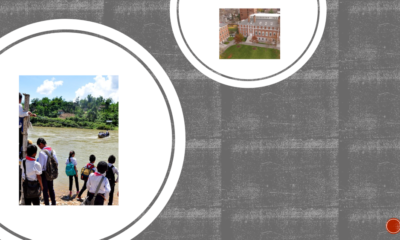
 Politics & Economy3 years ago
Politics & Economy3 years ago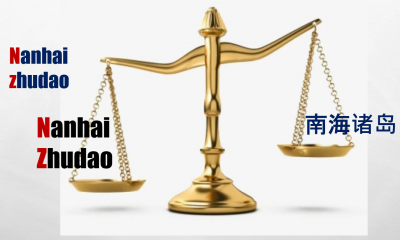
 Politics & Economy4 years ago
Politics & Economy4 years ago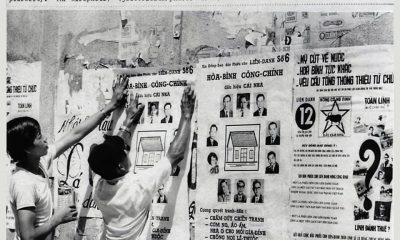
 ARCHIVES3 years ago
ARCHIVES3 years ago
